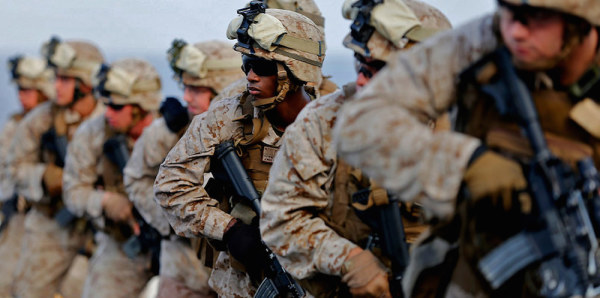

I went to college in the ‘90s. It was a heady time, with a good economy and great music. It was also the heyday of the original “political correctness” movement. Back then, events like a white student calling black women “water buffalo” at my alma mater, the University of Pennsylvania, earned that student an investigation, and that incident a place in every major media outlet.
Today, the second wave of political correctness has arrived. PC language today is about more subtle things, like “white privilege” and “trigger warnings.” Military veterans often brush such complaints off as people just being too sensitive. By and large, they’re right. If we can’t talk frankly about subjects such as race, gender, and sexual orientation, then the problems those groups face, some external and some internal, will never actually be solved. For example, whether the correct term is “black” or “African American,” it doesn’t change the fact that poverty affects that demographic more than the general population. Getting sidetracked talking about labels and feelings only means less time spent talking about how to actually fix things.
Many veterans and their families brush PC talk off with the “straight-shooter” excuse. “I’m not politically correct. I tell it like it is,” they say. Indeed, I’ve found that the military is generally not very politically correct, save for senior leadership. Service members often talk frankly about topics like race and gender. That’s probably part of why race relations in the military are better than in society as a whole. Honesty leads to truth, which leads to solving problems.
That tough self-assessment and frankness is absent when the discussion turns to veterans and their families themselves, though. Veterans have become the new third rail. God forbid someone talk about dysfunction among veterans or military families. There is a new type of politically correctbacklash to any discussion on the negative aspects of the military community. Just as with race or gender, people can have negative perceptions about veterans and their families, but apparently can never, ever, say them out loud.
Veterans and military families are the new “black,” so to speak. They are taking their place next to ethnic minorities, the LGBT community, the “differently-abled,” “little people,” “people of size,” and every other PC-protected victim group. The military community is now among the protected groups that we just can’t talk about, like some type of patriotic Voldemort. Many people think veterans are such delicate flowers that they have to be protected from even imaginary slights, like classic rock anthem “Fortunate Son” being played at a Veterans’ Day concert.
The thing is, just like every other demographic in every society, the military community has its bad actors. Pretending that the military community is perfect or that it needs to be protected and coddled only strains its credibility and holds it back. For example, there are some veterans and family members giving everyone else a bad name. They need to be called out. The military community as a group being overly sensitive doesn’t help matters.
Policing our own begins with correcting those embarrassing the military community. The individuals acting like jackasses in public are truly the individuals harming the community at large, not those who talk about them.
Correcting the bad actors isn’t being anti-veteran or anti-military family. It’s exactly the opposite. Getting wrapped up in group identity only leads to lumping the good in with the bad, to the disgrace of all. Fixing the internal problems of the military community, such as some members’ overactive sense of entitlement, gets us closer to fixing the real problems.
The military community faces bonafide, serious issues. Veterans’ health care, post-traumatic stress disorder and mental health discrimination, and attacks on well-earned pensions and benefits are the real problems affecting veterans and military families. As a community, we need to focus on actual issues, not perceived slights.
The sad part is that veterans are like minorities in an important way. Not that long ago, unfortunately, ethnic and racial slurs were commonplace. But, society has overcorrected that to the extent that sometimes people don’t know how to even talk about different groups (e.g., is it “American Indian” or “Native American” or “indigenous people” this week?) Frustration with the “PC police” has led many Americans who might be sympathetic to minorities to just throw their hands up and forget about them.
Similarly, some years ago, in the post-Vietnam era, the military and veteran communities were ostracized by the general public for being a part of a war that America was largely opposed to, suffering insults and even blatant discrimination. Today, we’ve overcorrected, and now just being critical of anyone or anything military is regarded as practically taboo. Not being subject to criticism also means being almost immune to self-improvement. Just as political correctness has actually harmed the causes of minorities in some cases, the over sensitivity of the military community is eventually going to make civilians tire of caring about them and their families.
Outrage doesn’t help anyone. Just because veterans have served doesn’t make them or their families perfect. Inside the military, we uphold the idea that all leaders need to know themselves and seek self-improvement. The military community as a whole also needs to seek self-improvement by accepting criticism when appropriate, so it can be a better leader in American society.